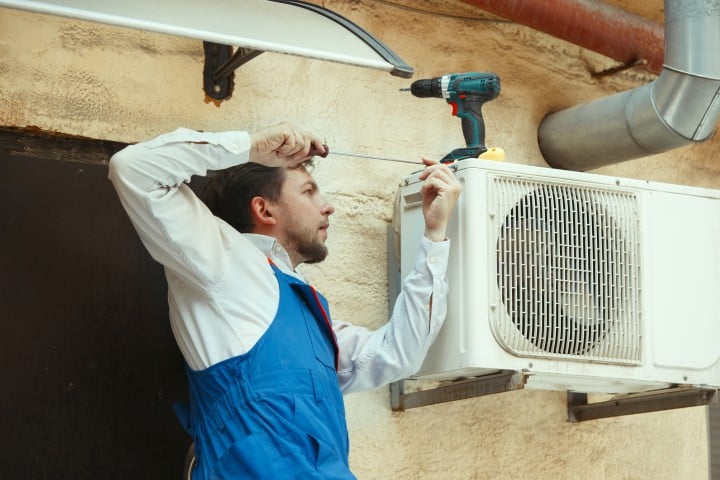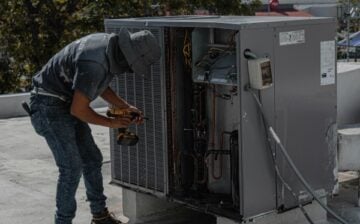The summer months are quickly approaching, and temperatures will soon begin to soar. When this happens, you’ll discover that a functioning air conditioner becomes more of a necessity than a mere luxury.
An efficient and effective cooling system is crucial to maintaining the general comfort level of your home. Over time, though, your AC can falter, leading to reduced cooling efficiency and greater discomfort. There are many potential reasons why your air con might start to get a little temperamental on you. One possible factor that may kick off this decline is the loss of refrigerant gas, essential to the cooling cycle.
Insufficient levels of refrigerant causes your air conditioning system to struggle to absorb and release heat effectively. This can lead to higher energy bills and inconsistent temperatures in your home. Once in a while, you may need to regas your air conditioner to keep the refrigerant at sufficient levels. But how often is often enough? That’s what we’re here to answer.
Understanding How Air Conditioning Works
Before we look at the ins and outs of regassing your home air conditioning, it can’t hurt to understand the fundamentals of how your air conditioner functions.
At the heart of an air conditioning unit is a refrigeration cycle that circulates refrigerant gas, absorbing and releasing heat to cool the air. The unit’s compressor pumps the refrigerant through the system, which absorbs heat from your home’s air and releases it outside. Powered by electricity, the refrigeration cycle guarantees a continuous and cool airflow into your room or throughout your home.
Now, this will only work effectively if your air conditioning system is equipped with adequate refrigerant gas levels. But how can you tell if your system has enough, or whether the refrigerant needs topping up?
Signs That Your Air Conditioner Needs Regassing
A smoothly running air conditioner is a must. We know that. If your air conditioner isn’t cooling as effectively as it should, there’s a chance it may need regassing.
Common indicators that may be telling you it’s time for a regas include:
- The system is blowing out warmer air than expected
- Longer cooling cycles
- Increased energy bills
- Unusual sounds from the unit
- Refrigerant leaks, evidenced by moisture near the system.
These possible indicators suggest that your unit may be under strain due to insufficient refrigerant levels. Regular checks and maintenance can help avoid these issues, allowing you to enjoy a more comfortable home and lower energy costs.
Factors That Can Influence Your Regas Frequency
It’s worth knowing that, unlike the air conditioner in your car, your home air con system shouldn’t typically need a regular regas. If installed correctly, it should never require regassing anyway as the gas doesn’t go stale or expire.
But it’s certainly worth understanding the factors that might affect how often you need to regas your air con.
- Hot summers lead to more frequent use, which can wear out refrigerant levels quickly.
- The age of your AC system also plays a role, with older models often forming leaks that require regassing.
- Maintenance history is another key factor—regular upkeep can detect leaks early and extend the lifespan of your system.
- Poor air conditioning system installation may result in refrigerant gas leaks that require a fix and replenishment.
Keeping these factors in mind can help homeowners maintain effective cooling when they most need it.
Helpful Maintenance Tips To Help Avoid Regassing Issues
We’ve said it already but it bears repeating – proper maintenance is essential to preventing frequent regassing of your air conditioner.
- Regularly clean or replace air filters to prevent blockages. This allows the unit to circulate air efficiently.
- Check for refrigerant leaks by examining the area around the unit for moisture or oil stains. A licensed technician can also provide a more thorough examination if necessary.
- Consider year professional servicing to make sure all components function correctly.
Consistent maintenance, particularly by a licensed aircon technician, can detect potential issues, and help you avoid more costly repairs later on.
Regassing: DIY or Professional Help?
So your air conditioner needs regassing. Is it something you can do yourself, or do you need a professional?
Simply put, regassing your air conditioner is not a DIY job and should always be left to a licensed technician. Handling refrigerant gases requires specialised knowledge and equipment, and is only available to people with a Refrigerant Handling Licence anyway.
Homeowners should be aware of the health and safety risks involved in working with these chemicals. If you mishandle them, they can be harmful. Professionals bring expertise and tools to ensure the job is done safely and correctly, minimising risks and protecting your unit’s performance.
Stay Cool and Comfortable This Summer
Maintaining an effective air conditioner is crucial for staying comfortable throughout the summer. To return to the original question of “How often should I regas my air conditioner?”, if it has been installed properly and serviced regularly, there’s every chance you won’t need a regas for a long time, if at all.
By addressing refrigerant levels, leaks, and overall system health, you can avoid costly repairs and ensure your unit performs optimally. In this way, your air conditioner remains reliable, protecting your well-being and providing a cool retreat from the scorching summer heat.
We hope you found this blog post on How Often Should You Regas Your Air Conditioner?, useful. Be sure to check out our post on Signs that Your Evaporative Cooler Needs Repair for more great tips!
Have Experience in the Moving Industry? Want an Additional Income Stream? Work With All Around Moving!
Partner with All Around Moving and join the Work With Us program. We’ll help you make money arranging moving services, by establishing your own moving consultant business operation. Read the simple terms by Clicking here to learn more.






